From The Blog
-
ConnectWise Slash and Grab Flaw Once Again Shows the Value of Input Validation We talk to Huntress About its Impact
Written by Sean KalinichAlthough the news of the infamous ConnectWise flaw which allowed for the creation of admin accounts is a bit cold, it still is one that…Written on Tuesday, 19 March 2024 12:44 in Security Talk Read 611 times Read more...
-
Social Manipulation as a Service – When the Bots on Twitter get their Check marks
Written by Sean KalinichWhen I started DecryptedTech it was to counter all the crap marketing I saw from component makers. I wanted to prove people with a clean…Written on Monday, 04 March 2024 16:17 in Editorials Read 1517 times Read more...
-
To Release or not to Release a PoC or OST That is the Question
Written by Sean KalinichThere is (and always has been) a debate about the ethics and impact of the release of Proof-of-Concept Exploit for an identified vulnerability and Open-Source…Written on Monday, 26 February 2024 13:05 in Security Talk Read 1066 times Read more...
-
There was an Important Lesson Learned in the LockBit Takedown and it was Not About Threat Groups
Written by Sean KalinichIn what could be called a fantastic move, global law enforcement agencies attacked and took down LockBit’s infrastructure. The day of the event was filled…Written on Thursday, 22 February 2024 12:20 in Security Talk Read 1018 times Read more...
-
NetSPI’s Offensive Security Offering Leverages Subject Matter Experts to Enhance Pen Testing
Written by Sean KalinichBlack Hat 2023 Las Vegas. The term offensive security has always been an interesting one for me. On the surface is brings to mind reaching…Written on Tuesday, 12 September 2023 17:05 in Security Talk Read 2084 times Read more...
-
Black Kite Looks to Offer a Better View of Risk in a Rapidly Changing Threat Landscape
Written by Sean KalinichBlack Hat 2023 – Las Vegas. Risk is an interesting subject and has many different meanings to many different people. For the most part Risk…Written on Tuesday, 12 September 2023 14:56 in Security Talk Read 1801 times Read more...
-
Microsoft Finally Reveals how they Believe a Consumer Signing Key was Stollen
Written by Sean KalinichIn May of 2023 a few sensitive accounts reported to Microsoft that their environments appeared to be compromised. Due to the nature of these accounts,…Written on Thursday, 07 September 2023 14:40 in Security Talk Read 2077 times Read more...
-
Mandiant Releases a Detailed Look at the Campaign Targeting Barracuda Email Security Gateways, I Take a Look at What this all Might Mean
Written by Sean KalinichThe recent attack that leveraged a 0-Day vulnerability to compromise a number of Barracuda Email Security Gateway appliances (physical and virtual, but not cloud) was…Written on Wednesday, 30 August 2023 16:09 in Security Talk Read 2056 times Read more...
-
Threat Groups Return to Targeting Developers in Recent Software Supply Chain Attacks
Written by Sean KalinichThere is a topic of conversation that really needs to be talked about in the open. It is the danger of developer systems (personal and…Written on Wednesday, 30 August 2023 13:29 in Security Talk Read 1833 times Read more...
Recent Comments
- Sean, this is a fantastic review of a beautiful game. I do agree with you… Written by Jacob 2023-05-19 14:17:50 Jedi Survivor – The Quick, Dirty, and Limited Spoilers Review
- Great post. Very interesting read but is the reality we are currently facing. Written by JP 2023-05-03 02:33:53 The Dangers of AI; I Think I Have Seen this Movie Before
- I was wondering if you have tested the microphone audio frequency for the Asus HS-1000W? Written by Maciej 2020-12-18 14:09:33 Asus HS-1000W wireless headset impresses us in the lab
- Thanks for review. I appreciate hearing from a real pro as opposed to the blogger… Written by Keith 2019-06-18 04:22:36 The Red Hydrogen One, Possibly One of the Most “misunderstood” Phones Out
- Have yet to see the real impact but in the consumer segment, ryzen series are… Written by sushant 2018-12-23 10:12:12 AMD’s 11-year journey to relevance gets an epic finish.
Most Read
- Microsoft Fail - Start Button Back in Windows 8.1 But No Start Menu Written on Thursday, 30 May 2013 15:33 in News Be the first to comment! Read 116474 times Read more...
- We take a look at the NETGEAR ProSafe WNDAP360 Dual-Band Wireless Access Point Written on Saturday, 07 April 2012 00:17 in Pro Storage and Networking Be the first to comment! Read 87393 times Read more...
- Synology DS1512+ Five-Bay NAS Performance Review Written on Tuesday, 12 June 2012 20:31 in Pro Storage and Networking Be the first to comment! Read 81936 times Read more...
- Gigabyte G1.Sniper M3 Design And Feature Review Written on Sunday, 19 August 2012 22:35 in Enthusiast Motherboards Be the first to comment! Read 80260 times Read more...
- The Asus P8Z77-M Pro Brings Exceptional Performance and Value to the Lab Written on Monday, 23 April 2012 13:02 in Consumer Motherboards Be the first to comment! Read 70894 times Read more...
Displaying items by tag: Android
Windows 8 on the EEE Slate Day 4 - Last Day
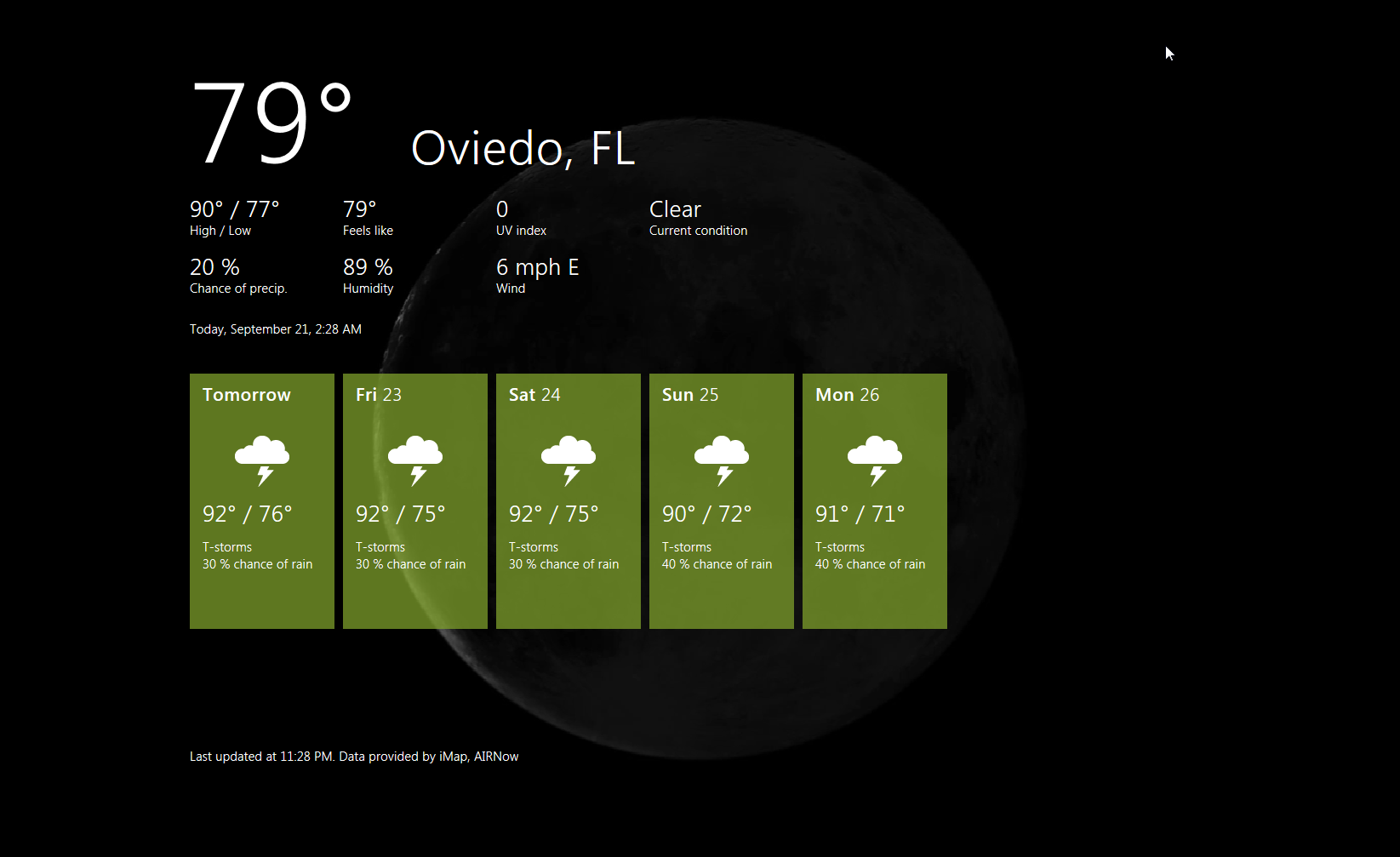 Four days, I lasted four days before I had to go back to Windows 7 on the EEE Slate. I tried to get Hyper-V running but the Core i5 on the system did not want to work the way it should. In the end I have come away with some interesting observations about the state that Microsoft’s next OS is in and where it could be by launch date. The first thing I have to remind everyone is that this is a developer’s preview. It is intended to allow App developers to push out apps for their Metro UI and also to ensure that software and hardware are ready (drivers mostly). By releasing it to the general public Microsoft has done a very smart thing. They are getting the OS out and on the street. People are actually running this as their main OS right now. Now this is all great if you are using something like a Laptop or even a desktop. There truly is very little that Windows 8 cannot do right now. However, when it comes to a tablet… things begin to fall apart. The problem is not that there is no touch screen support; it is that there seems to be no multi-touch support. On the EEE Slate EP 121 under Windows 7 I have multi-touch gestures and greater control. In Windows 8 that is gone. Instead of a two finger tap to right click my only option is touch and hold.
Four days, I lasted four days before I had to go back to Windows 7 on the EEE Slate. I tried to get Hyper-V running but the Core i5 on the system did not want to work the way it should. In the end I have come away with some interesting observations about the state that Microsoft’s next OS is in and where it could be by launch date. The first thing I have to remind everyone is that this is a developer’s preview. It is intended to allow App developers to push out apps for their Metro UI and also to ensure that software and hardware are ready (drivers mostly). By releasing it to the general public Microsoft has done a very smart thing. They are getting the OS out and on the street. People are actually running this as their main OS right now. Now this is all great if you are using something like a Laptop or even a desktop. There truly is very little that Windows 8 cannot do right now. However, when it comes to a tablet… things begin to fall apart. The problem is not that there is no touch screen support; it is that there seems to be no multi-touch support. On the EEE Slate EP 121 under Windows 7 I have multi-touch gestures and greater control. In Windows 8 that is gone. Instead of a two finger tap to right click my only option is touch and hold.
The matter is further complicated by Microsoft’s very immature Metro UI. It looks decent, but you cannot move things around to suit what you want or the layout you want. I do not like everything bunched up on one side on my tablet. I prefer it along the bottom. The Metro UI bunches the Apps and due to their different sizes breaks up any chance of a good flow. The lack of a Home button inside the individual apps is a big problem as well. Once you strip away the Metro UI you are left with a skinned Windows 7. Now I do like the new sharp corners as I think they make the windows look clean and show off a screen’s ability to reproduce good 2D imagery (well more like 2.5D).
The speed of Windows 8 is also very good. I was more than a little surprised to find this developer preview zipping along like it does. Usually at this stage of the game the OS does not feel very complete at all. There are speed issues, driver issues, and worse you name it you will probably run into it. In many cases (unless I have to) I do not really starting playing around with a new OS until it is at least at Beta 2 stage. Here you have things really ironed out and are looking for the little items. It is usually about this time that Microsoft opens up the Customer Preview Program and allows anyone to download the new OS. This early Developer’s Build really feels and performs much more like a Beta 2 than a dev preview.
So to wrap up my experience with Windows 8 on a tablet, I have to say I am impressed with quite a bit of it, but I do feel that this OS needs a LOT more work if it is going to compete head to head with Apple and Google in the tablet market. Sorry Microsoft, pretty Widgets and a cool keyboard is not enough to make it in this market space. You have to come up with something that no one else has or is doing, and as of right now, Windows 8 just does not have it for the Tablet Market. Let’s hope that by launch time these bugs are ironed out and we see a much improved version of Metro UI around August of next year.
For now we will get back to bringing you the news and our regular reviews..
Discuss in our Forum
It’s the same old, same old again…
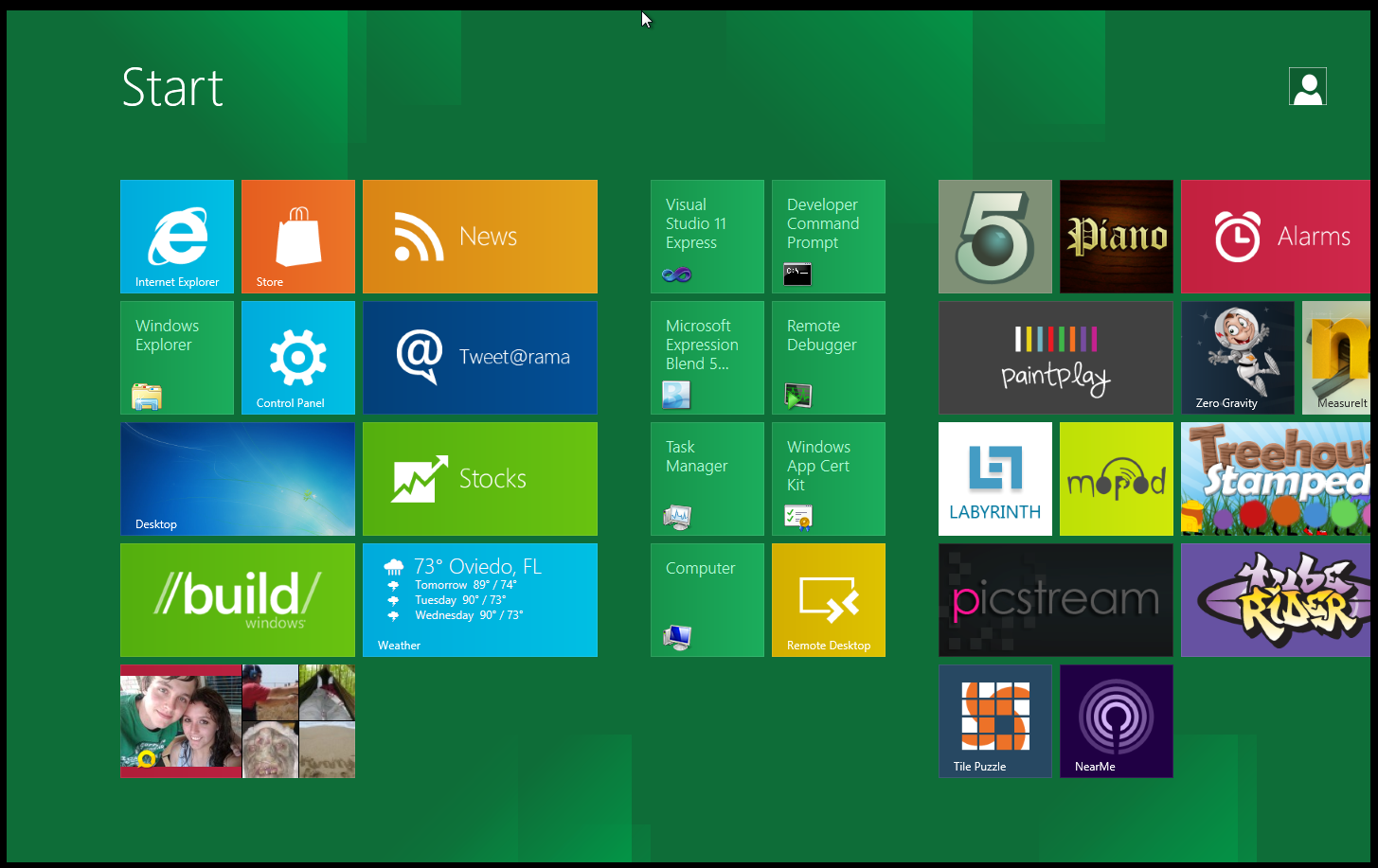 Now that Windows 8 has hit the “general public” in the form of a developer’s preview we are starting to see the internet community chime in about whether they like it or not. I have been reading quite a bit of this (as you can imagine) and have been struck once again by how people complain about, yet resist and fear any type of change.
Now that Windows 8 has hit the “general public” in the form of a developer’s preview we are starting to see the internet community chime in about whether they like it or not. I have been reading quite a bit of this (as you can imagine) and have been struck once again by how people complain about, yet resist and fear any type of change.
I have been working in the IT industry since the birth of Windows 3.0 one of my first large scale projects was implementing Windows 3.11 for workgroups into Fort Riley during my time with the US Army. I can remember the grumbling prior to this “new” software coming in about how the current system was terrible because it could not do this or that. When we brought Microsoft in (we even brought the early components of Office in) the same people that complained about the current UNIX based system were suddenly its biggest fan. I can remember one clerk who complained loudly and often about the system suddenly thought it was the best one we had. She did not like the new Windowed interface and Word was just horrible compared to her usual word processing application (which was called Wordstar).
Now take a big jump forward in time; Windows 8 is a rebuilt OS with a new (although somewhat cheesy) UI. Microsoft has really put in some effort to move with the market and change the OS to meet the needs of the new tablet based consumer. If you think about it more and more people are moving in the direction of the tablet/smart phone for their day to day needs. I am not saying it is there for productivity but for the general computing people do the tablet is the ideal platform. Microsoft HAD to change and reinvent its OS or it would be lost in the stampede of more and more powerful general usage tablets.
I personally own both an Android and Windows based tablet. One is the Asus EEE Slate EP121 the other is the Asus Transformer. When I want to tinker around or just surf the net I grab the light and small Tegra 2 armed (no pun intended) Transformer. When I want to do some work I grab the EP121 with its Core i5 470 UM and 4GB of RAM. The problem with Android (and even the iPad to a certain extent) is that there are no real productivity applications that truly work. Polaris Office, Documents to Go, and all of the others that I have tried all fall very short of the mark of MS Office or even Open Office. Apple knew this with the iPad so they came up with light versions of their productivity applications for iPad users. Android has nothing like this so it is hard for me to get real work done. Instead I surf the net looking for news and then add it to my Evernote account and pull out the EEE Slate or power up the desktop to get the real work done.
This brings us to Windows 8; Microsoft is taking a leaf out of Apple’s book here with their development of a light version of Windows 8 for ARM. It will give people a consistent feel to their computing experience. It the OS you run on your tablet looks and feels the same as the one you run on your desktop that is an improved user experience. Now you can also bet there is a version of Office in the works for ARM to keep that the same. It will be like the interaction between the iPad and Apple’s OSX clean and consistent. Microsoft is doing something very smart with this move and from what we are hearing many of the tablet makers are behind this movement. We know that nVidia certainly is.
Between now and the time that Windows 8 Launches (around November 2012) you will hear people taking sides ARM, x86, Windows 8, Windows 7 (much like those that did not want to leave XP), Tablet, Desktop, Laptop; the choices will be just as confused as some of the reasons to be on one side or the other. Just keep in mind that with one move Microsoft has made it possible to cover all of these. Windows 8 will work for ARM and x86. Windows 8 can run with the Metro UI for Tablets and can also run in Desktop Mode for more traditional PC’s and Laptops (giving you a Windows 7 feel). No matter the camp you are in it looks like Windows 8 could have something for you.
Discuss this in our Forum
HTC could be looking to buy WebOS
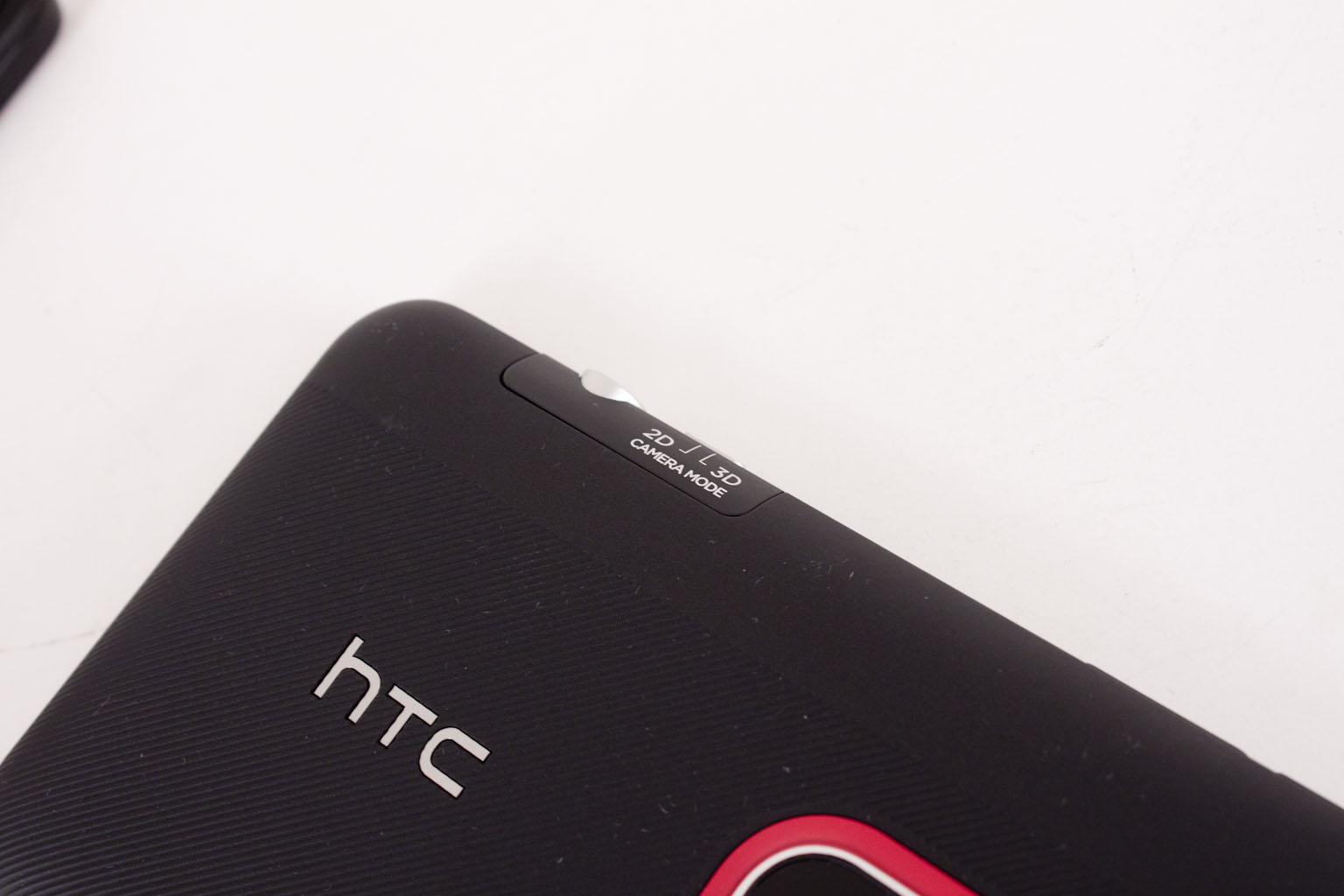 It has not even been a month since the announcement of HP’s decision to kill off the mobile operating system it bought from Palm WebOS. Now we hear that HTC could be considering buying this operating system from HP and starting its own mobile OS. If they do this it would put them in competition with a few companies that they have a long standing relationship with. I am also pretty sure that Google and Microsoft might think twice about stepping in to help (well ok help more) them in their ongoing (never ending) patent battle with Apple if they suddenly found themselves cut out of some of the business they get from HTC.
It has not even been a month since the announcement of HP’s decision to kill off the mobile operating system it bought from Palm WebOS. Now we hear that HTC could be considering buying this operating system from HP and starting its own mobile OS. If they do this it would put them in competition with a few companies that they have a long standing relationship with. I am also pretty sure that Google and Microsoft might think twice about stepping in to help (well ok help more) them in their ongoing (never ending) patent battle with Apple if they suddenly found themselves cut out of some of the business they get from HTC.
We also hate to say this but WebOS was not that much of a hit on the market. It had an impact at a time when Android was in its infancy, iOS sill did not have copy and paste and Windows Mobile OS 6… well we all remember WinMobile 6. We also think that now is not the time for HTC to be diving into this as they have quite a few fish in the pan already. The financial impact of buying WebOS, then developing it into something that is marketable and then pushing these products onto a market that is split into roughly two houses (Google and Apple) could end up being too much for the embattled company.
We really hope this is nothing more than a rumor and that HTC remains dedicated to making hardware and does not try to branch out and become its own channel.
Discuss in our Forum
Team-Touchdroid Gets full multitouch working with Android on HP's TouchPad
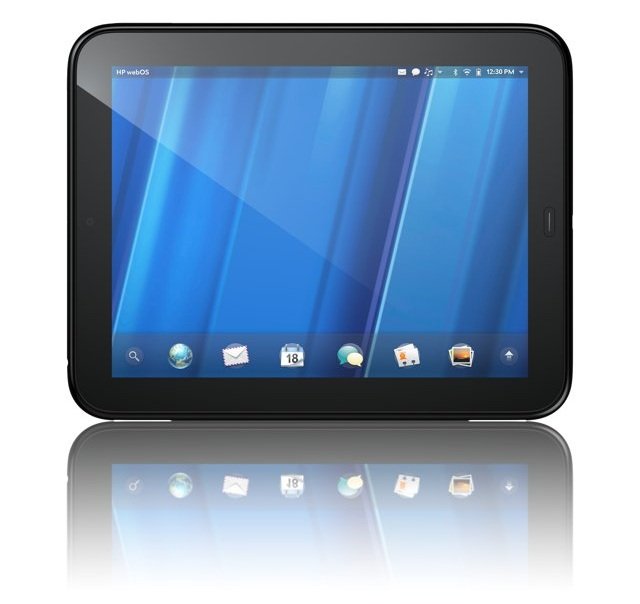 It looks like the cheapest Android Tablet on the market is now the HP TouchPad. Ever since HP announced the death of the WebOS division (the moved into another department) the rapidly changing company has been trying to unload all of the hardware they have sitting around. To accomplish this they dropped the prices on the TouchPad from $499 (16GB) and $599 (32GB) to $99 and $149 respectively. This price has caused something of a rush on them and most of the stores that carried them are all sold out. Now while many are snapping these up, there are some that are not interested in a product that will have an OS that is not going to truly be supported anymore.
It looks like the cheapest Android Tablet on the market is now the HP TouchPad. Ever since HP announced the death of the WebOS division (the moved into another department) the rapidly changing company has been trying to unload all of the hardware they have sitting around. To accomplish this they dropped the prices on the TouchPad from $499 (16GB) and $599 (32GB) to $99 and $149 respectively. This price has caused something of a rush on them and most of the stores that carried them are all sold out. Now while many are snapping these up, there are some that are not interested in a product that will have an OS that is not going to truly be supported anymore.
Well, have no fear. The gang known as Team-Touchdroid has found a way to get Android running on this hardware complete with full multitouch capability. Team-Touchdroid in combination with the group CyanogenMod (the ones that are responsible for most of the Rooted Android ROMs) have been working hard to make your new inexpensive investment pay off in a big way. Their progress has been amazing; the pair have already gotten 2.3.5 running on the device and now have added the full ten finger multitouch to the party. We are sure it will not be long before they achieve their goal of porting HoneyComb to these now very cheap but hard to find tablets. Check out the video below
Source Team-TouchDroid
Discuss in our Forum
nVidia looking for the mobile market to grow
 About two years ago, roughly the same time as the ZuneHD hit the market with the first Tegra inside, nVidia CEO Jen-Hsun Huang made a prediction of sorts. He stated that he envisioned a time when the GPU was not the bread and butter of nVidia. Instead he saw the mobile CPU and the SoC (system on chip) as the wave of the future. Of course he could not get away from his graphical legacy, so his vision also included an nVidia GPU (or two) along with the mobile CPU. At the time the press sort of overlooked the story. It was not that news worthy. After all the Tegra only had one well known design win (there were others but many never reached the market) the ZuneHD. Arguably it was (and still is) a great product, it just was marketed VERY poorly and was going head to head with the greatest show on Earth; the Apple marketing team.
About two years ago, roughly the same time as the ZuneHD hit the market with the first Tegra inside, nVidia CEO Jen-Hsun Huang made a prediction of sorts. He stated that he envisioned a time when the GPU was not the bread and butter of nVidia. Instead he saw the mobile CPU and the SoC (system on chip) as the wave of the future. Of course he could not get away from his graphical legacy, so his vision also included an nVidia GPU (or two) along with the mobile CPU. At the time the press sort of overlooked the story. It was not that news worthy. After all the Tegra only had one well known design win (there were others but many never reached the market) the ZuneHD. Arguably it was (and still is) a great product, it just was marketed VERY poorly and was going head to head with the greatest show on Earth; the Apple marketing team.
Jump forward to today and we find the Tegra and the Tegra 2 in many devices. In fact one of the best-selling Android tablets on the market today has a Tegra 2 dual core SoC inside (for those of you that do not know it is the Galaxy Tab 10.1) this is followed by devices like the Asus EEE Pad Tansformer and others. They really have come a very long way in terms of the smartphone and tablet market. Of course they still have Apple to contend with (and their legal and marketing teams) so the battle is not won just yet. However, what we are seeing is that Huang’s vision is coming to pass. nVidia just might find itself earning more than 50% of their income from the tiny SoC and not their high-end GPUs.
Still the road ahead is not completely clear, nVidia will face competition in the form of Qualcom (which just bought BigFoot Networks), as well as Samsung and Even Apple (to a lesser degree) in this new market. As for Intel, Huang says they are not worried about them because the Atom is not an ARM CPU and is not even “speaking the same language”. He feels that the lower cost ARM based tablets will be more attractive to the consumer looking for a small and light system. With the advent of Windows 8 for ARM people will also gain the ability to move back and forth between ARM and x86 keeping things on almost the same platform. This will help to bring the more “desktop centric” consumers into the fold especially with the prospect of a quad core ARM CPU running Windows 8 on the horizon.
It is when companies have to innovate to survive that some of the coolest things arise. I wonder what we will see from Tegra in near future and what lessons from Tegra will nVidia take to other departments to help improve them?
Source CNET
Discuss in our Forum
Who Will Benefit more? Google or Motorola?
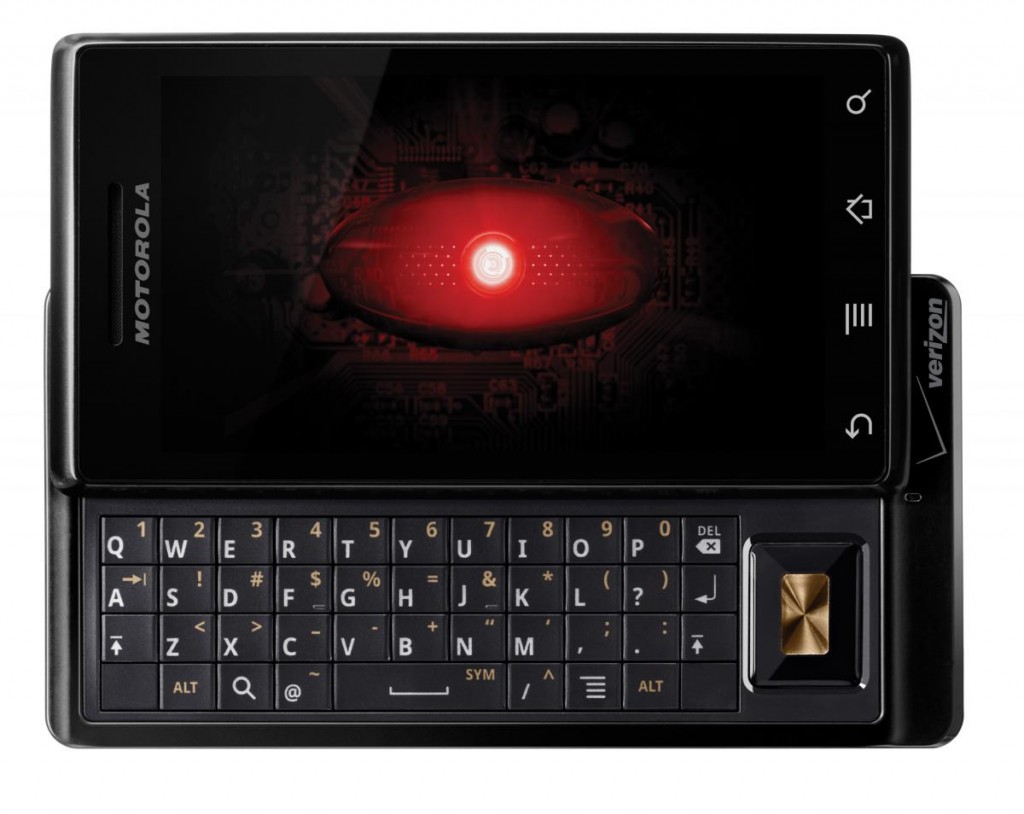 Although the news of Google’s purchase of Motorola Mobility is days old we have to wonder about the slew of articles that have come out recently. We all know (whether we choose to admit it or not) that the purchase of Motorola was to bolster Google position in the market of the mobile OS. They, like others, have a lot to fear from Apple’s seemingly endless supply of accusations of copying, patent infringement and friendly venues. However, the deal is more than that in reality.
Although the news of Google’s purchase of Motorola Mobility is days old we have to wonder about the slew of articles that have come out recently. We all know (whether we choose to admit it or not) that the purchase of Motorola was to bolster Google position in the market of the mobile OS. They, like others, have a lot to fear from Apple’s seemingly endless supply of accusations of copying, patent infringement and friendly venues. However, the deal is more than that in reality.
Motorola has an 82 year legacy of working with wireless (not the wireless we think of today but radios as well). Because of this they not only have a nice stable of patents but also the technology and the innovation to survive in the cut throat world of mobile devices. The problem has been their “IBM” attitude in the past. Anyone that knows (or would like to Google) the IBM culture will know that the uniform was black slacks, white button down and tie. This is what you wore no matter where you worked. Motorola was the same way until very recently. That kind of rigidity in your culture does stifle innovation to a great degree. After all if you always wear the same thing, you can find yourself always thinking the same things. People that are locked down by their environment can become stagnant and, in extreme cases, ineffective.
So adding the fresh and open culture of Google to this can help out the struggling Motorola quite a bit; while the structure of Motorola may also help Google. It also gives Google something they want and need; a direct market for their OS. Google has been slowly closing the “Open Source” of Android with each successive release and we are looking at a completely closed source Kernel and OS in the very near future. Although Google invites other phone makers to use and customize Android’s UI they still want to have phones of their very own and with Motorola’s $86 Million dollar loss on top of their still popular “Droid” line of smart phones I am sure this looked like a ready-made situation for Google.
Motorola does get to keep operating as its own entity (for now) but you can rest assured that Google is also banking on those nice new Patents to keep Apple’s lawyers at bay.
Discuss in our Forum
Apple Evidence Against Samsung Found Inaccurate
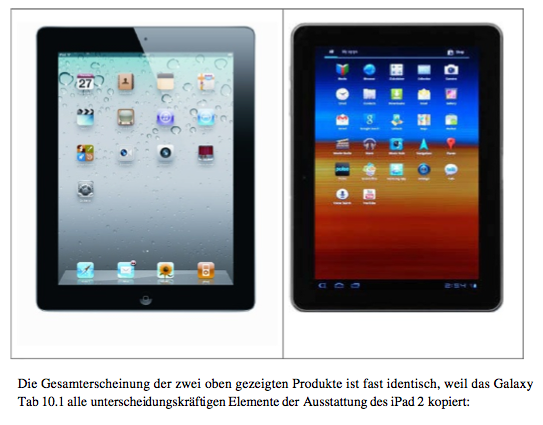 It looks like Apple may have made a serious blunder in their EU case against Samsung. As we have told you previously Apple has made the claim that Samsung copied the iPad2 in their design of the Galaxy Tab 10.1. As such they have sought an injunction and been granted a preliminary one banning sales of the Tab 10.1 in all areas of the European Union except the Netherlands.
It looks like Apple may have made a serious blunder in their EU case against Samsung. As we have told you previously Apple has made the claim that Samsung copied the iPad2 in their design of the Galaxy Tab 10.1. As such they have sought an injunction and been granted a preliminary one banning sales of the Tab 10.1 in all areas of the European Union except the Netherlands.
However, we are hearing now that some of the evidence presented was inaccurate. According to Macworld and WebWereld.nl the images used do not show the Tab 10.1 properly. According to Samsung’s site the Tab 10.1 has dimensions of 257.7 x 175.3mm this represents an aspect ratio of 1:1.46. Careful review of the image in Apple’s complain reveal that it has an aspect ratio closer to 1:1.36 putting it very close to the dimensions of Apple’s iPad2.
Now the question is whether Apple actually manipulated this image or if they used outdated images (knowingly or not). If it is the former then Apple is in serious trouble as they have presented false evidence in a legal proceeding. If it is the later then they will still face some serious consequences as it is the plaintiff’s responsibility to present accurate information in any litigation (even in the EU). Samsung has filed an appeal to the original injunction and with this new evidence they have a very good chance of winning. No matter the cause I am sure that the Court System will be keeping a closer eye on Apple in the future. Let’s remember Apple’s presentation during the “grip of death” problem and the iPhone 4 where they cherry picked three phones to prove the grip issue was global. After that incident it was shown that even with those phones the issue was very limited and not the same as what Apple was trying to show. It actually prompted statements and the threat of legal action from Samsung and HTC at the time. So we would honestly not be surprised to find that Apple knowingly used an outdated image of the Tab 10.1 in their evidence to further their case.
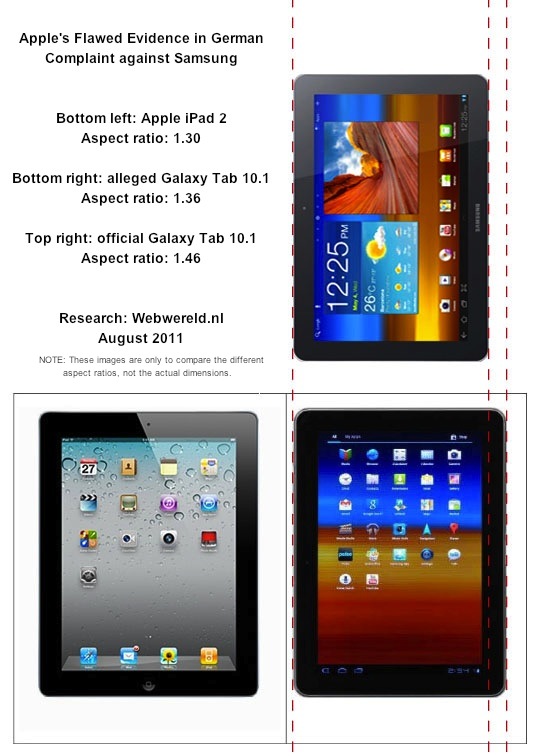 Picture Credit WeWerld.nl
Picture Credit WeWerld.nl
It will be interesting to watch the outcome of this one.
Discuss this in our forum
Credit to forum member Kelevmor for passing this one along.
What will Windows 8 mean to Apple’s Litigation Spree?
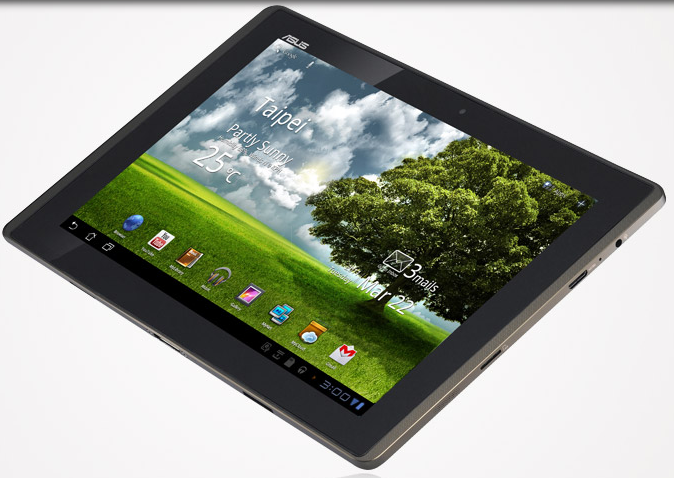 Apple has been having a blast dropping patents for vague concepts and even an entire device type (with their pending Pico Projector patent) regardless of prior art and at times regardless of if the patent is actual technology or not (the look and feel of something). Then they take these patents and wave them in the face of judges that have no real idea of what the patent is (or is not) covering asking for injunctions and outright bans on products from companies that are relatively underfunded in the legal department. If you ask Apple about this they will stand and say that they are protecting their Intellectual Property (which in many cases was “borrowed” from another company that cannot afford a legal fight with Apple like S3). This abuse of the patent and copyright system is detestable, but is an article for another day.
Apple has been having a blast dropping patents for vague concepts and even an entire device type (with their pending Pico Projector patent) regardless of prior art and at times regardless of if the patent is actual technology or not (the look and feel of something). Then they take these patents and wave them in the face of judges that have no real idea of what the patent is (or is not) covering asking for injunctions and outright bans on products from companies that are relatively underfunded in the legal department. If you ask Apple about this they will stand and say that they are protecting their Intellectual Property (which in many cases was “borrowed” from another company that cannot afford a legal fight with Apple like S3). This abuse of the patent and copyright system is detestable, but is an article for another day.
The question I am wondering is, why has Apple not gone after Microsoft? Windows 7 on a tablet has Pinch to Zoom, finger gestures and even the same “look and feel” when you scroll with your finger. Now, I could be wrong, but if Apple is trying to protect their IP you would think they would be going after Microsoft in a big way. I am also pretty sure they would be adding Asus (who has one of the best-selling Windows Based Tablets on the market right now) to their legal wish list as well. So, why do they leave these two obvious copy cats out of the litigation arena?
Well, here are a few reasons that we were able to come up with based on research. Microsoft is safe simply because they have bailed out Apple multiple times in the past and also have several patents and items that Apple needs to survive (Office for Mac is still a huge seller). Whether the Apple faithful and Steve Jobs want to admit it or not Apple owes it very existence to their rival; without Bill Gates and Microsoft we would be talking about Apple in the past tense. Right now Adobe is wishing they had dropped money into that bailout instead of just spending time and money making their products work on Apple’s RISC (Reduced Instruction Set Computer) based systems (the PowerPC days). If they had, they perhaps they would have some leverage in the whole HTML5 Vs. Flash competition. This also applies to Microsoft’s net generation operating system Windows 8. In fact is applies even more as Microsoft is writing it to work on ARM based CPUs. The previews that we have seen also make it very tablet friendly and an obvious threat to Apple’s weakening hold on the tablet market. Yet, we have heard no call to arms from the Apple legal team over this.
So, what about Asus and their tablets? Asus is also untouchable right now because they also have something that Apple wants; A manufacturing facility. Apple has been looking for alternatives to Foxconn due to the bad press surrounding the company’s many suicides. The world now knows that the iPhone, iPod and many other Apple products are assembled there and with the many deaths over working conditions at these plants the eyes are turning to look at Apple. The question has already been raised by many humanitarian groups “why has Apple done nothing about this?” You would think that a company that claims to be so “Green” and Earth Friendly would be appalled by what is happening over there. However, other than a few press releases (which usually tame the faithful) Apple has done nothing. At least on the surface, we have heard rumors that Apple is courting Pegatron as an alternative manufacturing site for the next generation of iToys. If this is true (and as of now we have no evidence to the contrary) then Apple would not want to get Asus upset. After all Asus owns Pegatron. It is their manufacturing company.
So then next time you hear an Apple press representative standing on the soapbox and loudly declaiming how they are protecting their Intellectual Property from the masses of thieves and copy-cats out there, just remember that they are only throwing this around at the companies they feel they can bully into submission. In the end no one likes a bully, and bullies usually reap what they sow in the long run.
FTC checking to see if Google is restricting Android Phone makers
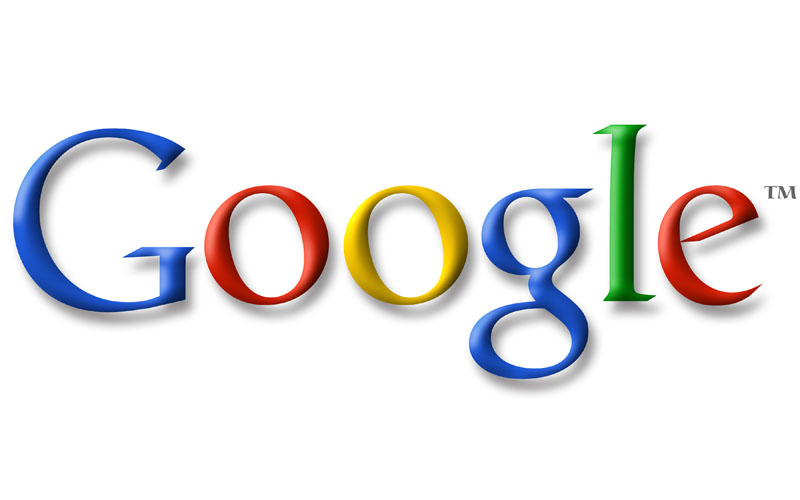 There are things that I find ironic but that seem to go unnoticed by many (mostly the press). Today I read an article that the FTC is looking into claims that Google might have put restrictions in place for manufacturers that make Android based smart phones. Now, I have no lover for Google. I think they do not care about people’s privacy, ignore laws and worse. However, to see the FTC starting to investigate them for antitrust issues is laughable when this same commission said there was no credible evidence that Apple was doing this. It is funny that the investigation appears to be looking into if Google is preventing the use of services such as mapping, navigation etc. other than their own on Android based phones. After all wasn’t it Apple that put a stipulation to app developers that they could not develop an app that reproduced core functions of the phone?
There are things that I find ironic but that seem to go unnoticed by many (mostly the press). Today I read an article that the FTC is looking into claims that Google might have put restrictions in place for manufacturers that make Android based smart phones. Now, I have no lover for Google. I think they do not care about people’s privacy, ignore laws and worse. However, to see the FTC starting to investigate them for antitrust issues is laughable when this same commission said there was no credible evidence that Apple was doing this. It is funny that the investigation appears to be looking into if Google is preventing the use of services such as mapping, navigation etc. other than their own on Android based phones. After all wasn’t it Apple that put a stipulation to app developers that they could not develop an app that reproduced core functions of the phone?
Then there was Steve Job’s rather public rant about never allowing flash on the iPhone, their arbitrary app approval process and many other items are even more conclusive. To me this illustrates that our federal regulators have no clue what is going on and only do what they are told by the person throwing the most cash around The Hill. Interestingly enough that used to be Michael Schmidt and Google, but now we see Google’s charm wearing off.
Still I am glad to see that the FTC is looking into some of the advertising and search practices that Google is participating in. For years it has pretty much been common knowledge that Google stacks some of the search results and their ad placement is something of a joke. Maybe some good will come of this, but they really need to stop turning a blind eye to companies like Apple and begin to actually do their jobs and protect the public from ALL companies that participate in this type of activity.
Source Cnet
Discuss in our Forum
Yup, hackers get married and have kids too…
 At Defcon 19 in Las Vegas this year the annual security show launched a new event. Called Defcon Kids the even features young “hackers” that have uncovered exploits, vulnerabilities and other security related items. One of the first to speak this year is a 10-Year Old Girl from California who found an exploit in some mobile games.
At Defcon 19 in Las Vegas this year the annual security show launched a new event. Called Defcon Kids the even features young “hackers” that have uncovered exploits, vulnerabilities and other security related items. One of the first to speak this year is a 10-Year Old Girl from California who found an exploit in some mobile games.
The girl, who goes by the alias CyFi (and who is a Girl Scout as well) found the new exploit because she did not want to wait for certain in-game items to complete in a farming game that she plays. To get around this boring wait she simply moved time along. When she did this it opened up the exploit. Independent researchers have verified her findings, but will not list the games that are affected by this (no will CyFi giving the authors a chance to fix things).
CyFi also said that while many games have cheat prevention systems she found that most can be circumvented with a few simple techniques. The Exploit affects both iOS and Android operating systems and illustrates how developers and security experts alike can miss something simple while overthinking their protections and applications.
Source and Image Cnet
Discuss thus on our Forum
